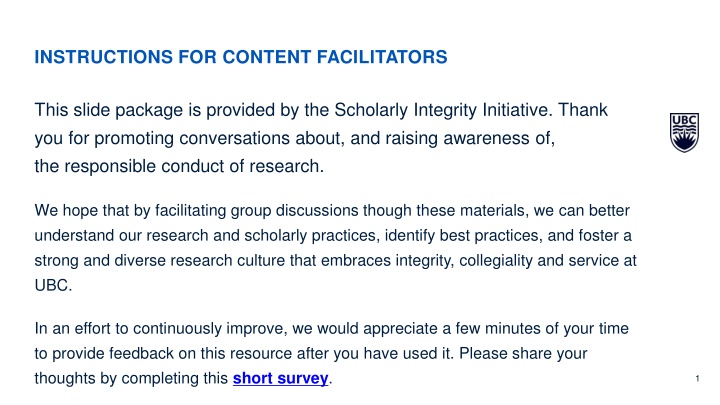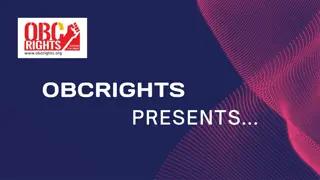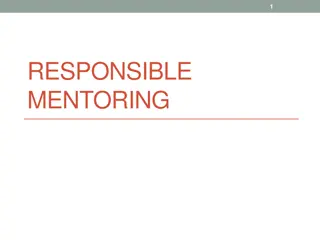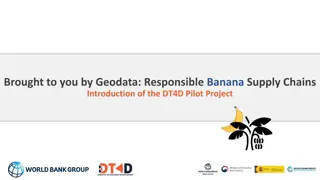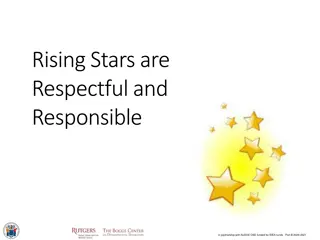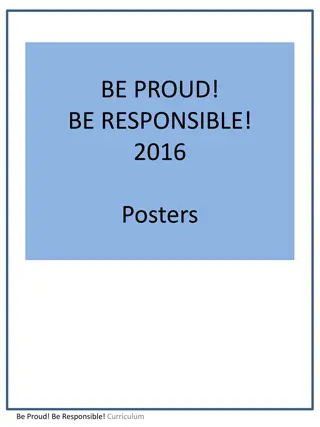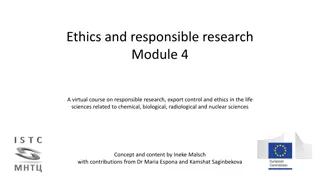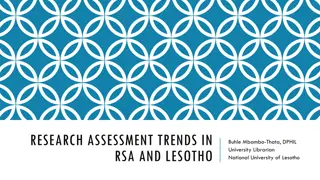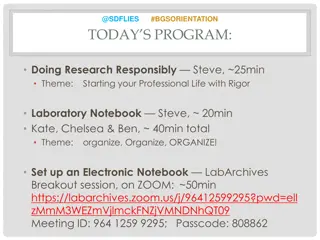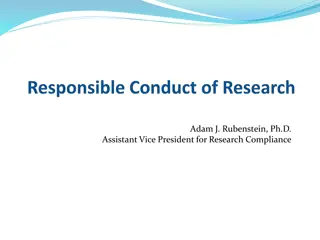Promoting Responsible Research Practices
This slide package provided by the Scholarly Integrity Initiative aims to facilitate group discussions on responsible research conduct, fostering a culture of integrity and collaboration at UBC. The resources cover key topics like data sharing, scholarly standards, and research best practices. Facilitators can customize presentations based on audience needs and engage in conversations to enhance research practices and integrity in academia.
Download Presentation

Please find below an Image/Link to download the presentation.
The content on the website is provided AS IS for your information and personal use only. It may not be sold, licensed, or shared on other websites without obtaining consent from the author.If you encounter any issues during the download, it is possible that the publisher has removed the file from their server.
You are allowed to download the files provided on this website for personal or commercial use, subject to the condition that they are used lawfully. All files are the property of their respective owners.
The content on the website is provided AS IS for your information and personal use only. It may not be sold, licensed, or shared on other websites without obtaining consent from the author.
E N D
Presentation Transcript
INSTRUCTIONS FOR CONTENT FACILITATORS This slide package is provided by the Scholarly Integrity Initiative. Thank you for promoting conversations about, and raising awareness of, the responsible conduct of research. We hope that by facilitating group discussions though these materials, we can better understand our research and scholarly practices, identify best practices, and foster a strong and diverse research culture that embraces integrity, collegiality and service at UBC. In an effort to continuously improve, we would appreciate a few minutes of your time to provide feedback on this resource after you have used it. Please share your thoughts by completing this short survey. 1
HOW TO USE THIS RESOURCE There are two sections to this slide deck resource. 1. The first section is a core slide presentation. Use this to introduce concepts, discuss terminology, and generate discussion with your audience. 2. The second section includes additional slides that you can add to the core presentation, depending on the needs of your audience. Facilitator notes are provided with each slide. Before delivering this material, you should familiarize yourself with the Scholarly Integrity Policy and the relevant scholarly standards within your discipline. If you need additional support, please contact the Scholarly Integrity Initiative. 2
ADAPTING AND SHARING THIS RESOURCE This introductory slide deck is licensed under the Creative Commons Attribution 4.0 International License, which allows you to share and adapt this resource as long as you give appropriate credit, provide a link to the license and indicate if changes were made to the content. For more information about this license, please visit: http://creativecommons.org/licenses/by/4.0/ Please attribute to the Scholarly Integrity Initiative, Office of the Vice-President, Research & Innovation, The University of British Columbia. 3
DATA SHARING The Scholarly Integrity Initiative HTTPS://RESPONSIBLE.RESEARCH.UBC.CA
INTRODUCTION What is data sharing? What are some considerations when sharing data? Why is it important? How does it relate to scholarly integrity? 5
Making research data available and accessible supports scholarly integrity by: Building on the work of others and allowing for validation and verification of research data, analysis and conclusion Fostering research collaboration Enabling cost-saving and effective use of research funds Building public confidence and trust in the process and outcome of research 6
Making research data widely available, easy to interpret and reproducible can improve the accuracy of and enhance the robustness of the research. However, it is important to know how to do so responsibly. What does this mean for us? 7
WHAT DOES THIS MEAN FOR US? Adhere to funding agency, institutional and/or journals policies related to data sharing Keep an organized and detailed record of your research data and processes to facilitate data-sharing Seek support and guidance around sharing data responsibly (e.g., digital infrastructure, data privacy, data licenses) What else? 8
SUPPORT & RESOURCES Policies & Guidelines Tri-Agency Research Data Management Policy UBC's Information Systems Policy UBC s Information Security Standards UBC Support Services Research Data Management, UBC Library Research Commons, UBC Library Tools & Resources Data Privacy & Information Security: Researcher s Checklist, UBC Advanced Research Computing 9
DE-IDENTIFICATION The use of one or more techniques designed to make it impossible or at least more difficult to identify [a particular individual, a sensitive location, or sacred cultural practices] from stored data related to them. - Casrai.org 12
LICENSE A license defines what others may or may not do with your data. It is applied when you publish and deposit your data. Two sources for data licenses: Creative Commons (CC) Open Data Commons (ODC) 13
CASE STUDIES 14
Ezra wanted to validate their methodology and data with publicly available data from a study that had already been published. They performed some standard quality checks on the deposited raw data and discovered discrepancies between the publication and the deposited raw data. What should Ezra do? 15
Tim and Kershawn are conducting telephone surveys of their respective public institutions to save time and money. Tim realises that he is not going to reach his target number by the deadline and asks Kershawn for help. Kershawn agrees, and asks Tim to email the names and telephone numbers of the participants that Tim isn t able to contact. Should Tim send the names and telephone numbers via email? 16 Used with permission. Adopted from American Sociological Association. Ethics Case Studies.
